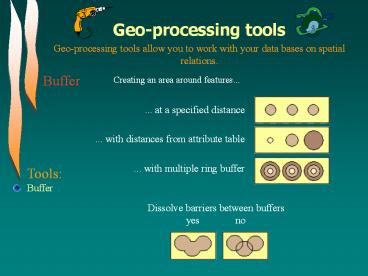Geo-processing tools PowerPoint PPT Presentation
1 / 18
Title: Geo-processing tools
1
Geo-processing tools
Geo-processing tools allow you to work with your
data bases on spatial relations.
Buffer
Creating an area around features...
... at a specified distance ... with distances
from attribute table ... with multiple ring
buffer
- Tools
- Buffer
Dissolve barriers between buffers yes
no
2
Geo-processing tools
Geo-processing tools allow you to work with your
data bases on spatial relations.
Buffer
Example
- Tools
- Buffer
3
Geo-processing tools
Geo-processing tools allow you to work with your
data bases on spatial relations.
Clip
Cutting the extend of one feature with another
feature
Example
You have obtained a state wide data set, but you
only want to cover your county...
Polygon, Line or Point feature
- Tools
- Buffer
- Clip
4
Geo-processing tools
Geo-processing tools allow you to work with your
data bases on spatial relations.
Merge
Combine features with same feature class (point
to point, line to line etc.)
Datasets can be adjacent
Example
You have a road layer for your county, and now
you need to add a layer with recently built roads
...
- Tools
- Buffer
- Clip
- Merge
or overlapping.
5
Geo-processing tools
Geo-processing tools allow you to work with your
data bases on spatial relations.
Union
Combining two polygon features intersecting all
polygons
Example
You have a layer with phases of your landfill and
a soil layer. You need to know the area of the
different soils for each phase ...
- Tools
- Buffer
- Clip
- Merge
- Union
6
Geo-processing tools
Geo-processing tools allow you to work with your
data bases on spatial relations.
Dissolve
Aggregate your data based on the value of a field
Example
You have a parcel layer with the information
which parcel is served by what garbage disposal
service. Now you want to show the general service
areas for all disposal services...
- Tools
- Buffer
- Clip
- Merge
- Union
- Dissolve
7
Geo-processing tools
Geo-processing tools allow you to work with your
data bases on spatial relations.
Intersect
Eliminates areas where two polygon features DO
NOT overlap
Example
The new landfill should be located within x miles
of the two transfer stations ...
- Tools
- Buffer
- Clip
- Merge
- Union
- Dissolve
- Intersect
8
Geo-processing tools
Geo-processing tools allow you to work with your
data bases on spatial relations.
- Tools
- Buffer
- Clip
- Merge
- Union
- Dissolve
- Intersect
9
Create new datasets/layers
- Create Layer from x,y Data
- Geo-referencing images
- Adding a CAD
10
Create new datasets/layers
Create Layer from x,y Data
- Requirements
- Create a table with the coordinates and any
additional info. - The coordinates have to be either decimal degrees
or map units
11
Create new datasets/layers
Create Layer from x,y Data
- Requirements
- Create a table with the coordinates and any
additional info. - The coordinates have to be either decimal degrees
or map units
- Steps
- Open the map, load the table with x,y data
- Under Tools click Add X,Y data
- Select the table and the fields with the
coordinates.
12
Create new datasets/layers
Geo-referencing images
- Open the map and load the image
- Zoom to the extend on your map
- Select the image, click on Georeferencing and
Fit to Display
13
Create new datasets/layers
Geo-referencing images
- To add Control Points clic on
- Add Control Points
- Click on a known position on the image
- Click on the position on the map
14
Create new datasets/layers
Geo-referencing images
- To view Control Points clic on
- Verify results
- Click on Auto Adjust to move image
- Click on Update Georeferencing to finalize
15
Create new datasets/layers
Adding a CAD
- Steps
- Load GIS and CAD data
- Select 2 points on the CAD
- Identify those points in GIS data
- Note x,y coordinates for all points
16
Create new datasets/layers
Adding a CAD
- Steps
- Open Layer Properties of the CAD
- SelectTransformations Enable Trans...
Coordinates - Fill in the coordinates of the 4 points
17
Create new datasets/layers
Adding a CAD
- Steps
- Create a txt file with coordinates
- Select World File
- Browse to the txt file
18
Create new datasets/layers
Do it!

